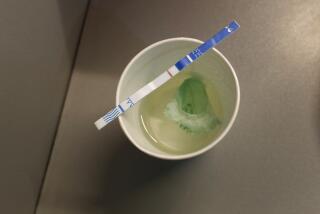Follow directions on home test kits
At-home test kits adhere to the same basic formula. For collection kits, patients apply blood, saliva, stool samples or bodily secretions to a paper or swab included in a kit. The specimen is sealed in a container and the packet is mailed to the lab noted on the outside of the package. Lab results are sent either directly to the patient (depending on respective state law) or in some cases, to a healthcare provider.
In California, only results of cholesterol, pregnancy, fecal occult, glucose and over-the-counter HIV-collection tests can be given directly to patients; other tests must go through a healthcare practitioner. About half the nation’s states allow labs to send results to patients.
Although health insurance companies don’t pay for over-the-counter home-health tests (unless a physician orders them or sends one home with a patient as with fecal occult tests), consumers can use flex-spending account money to pay for them. Prescription drug treatments are paid for by insurance. The cost for the tests ranges from about $13 (cholesterol, urinary tract infection kits) to about $48 (HIV collection kit and test).
The simplest tests use chemical-reaction strips such as those found in urinary tract infection tests -- and the results are almost immediately available. In that example, the strips turn a certain color within minutes if nitrites and leukocytes (white blood cells) are present in urine; for treatment, the patient must then contact a doctor for a follow-up appointment.
But test results, even from an FDA-approved home test, should not always be considered a definitive diagnosis.
“In general, the home-test kits don’t have to adhere to the same level of standard as clinical labs,” said Dr. Jane F. Emerson, chief of clinical pathology at USC’s Keck School of Medicine. “Plenty of the at-home tests give good valid results or they would not get FDA approval, but any doctor understands that the first rule of validating a result is you repeat the test.”
Like medical tests given by a doctor, home-use tests carry a risk of false positives and false negatives.
“What really affects the accuracy of home-use tests is how well a patient is following the directions,” said Dr. Lori Heim, president of the American Academy of Family Physicians. “Some of them are a little tricky. Time of day can matter for urine samples. For fecal occult tests [screening for bowel cancer by detecting blood in the stool] there are lots of false positives for people who drink red wine, eat red meat or take aspirin that can cause micro-bleeding.”
Teasing out what might cause a false positive requires the expertise and experience of a physician. Most tests also require specific timing, material and sample amounts -- and some require specific storage conditions. Careful reading of instructions is critical. There should be a toll-free telephone number listed on all home-use tests for consumer questions. If there are doubts about a test result, a call to the doctor is in order.
No one should change medications or dosages based on a home-use test without talking to a doctor, said Heim.
-- Kathleen Kelleher
More to Read
Sign up for Essential California
The most important California stories and recommendations in your inbox every morning.
You may occasionally receive promotional content from the Los Angeles Times.










